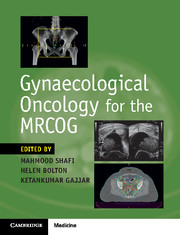Book contents
- Gynaecological Oncology for the MRCOG
- Gynaecological Oncology for the MRCOG
- Copyright page
- Dedication
- Contents
- Contributors
- Preface
- Abbreviations
- 1 Epidemiology of Gynaecological Cancers
- 2 Pathology of Gynaecological Cancers
- 3 Imaging in Gynaecological Oncology
- 4 Concepts of Treatment Approaches in Gynaecological Oncology
- 5 Radiation Therapy for Gynaecological Malignancies
- 6 Systemic Therapy in Gynaecological Cancers
- 7 Preinvasive Disease, Screening and Hereditary Cancer
- 8 Surgical Principles in Gynaecological Oncology
- 9 Role of Laparoscopic Surgery
- 10 Ovarian, Fallopian Tube and Primary Peritoneal Cancer (including Borderline)
- 11 Endometrial Cancer
- 12 Cervical and Vaginal Cancer
- 13 Vulval Cancer
- 14 Uterine Sarcomas
- 15 Non-epithelial Ovarian Tumours and Gestational Trophoblastic Neoplasia
- 16 Palliative Care
- 17 Living with Cancer
- 18 Communication in Gynaecological Oncology
- Appendix
- Index
9 - Role of Laparoscopic Surgery
Published online by Cambridge University Press: 14 April 2018
- Gynaecological Oncology for the MRCOG
- Gynaecological Oncology for the MRCOG
- Copyright page
- Dedication
- Contents
- Contributors
- Preface
- Abbreviations
- 1 Epidemiology of Gynaecological Cancers
- 2 Pathology of Gynaecological Cancers
- 3 Imaging in Gynaecological Oncology
- 4 Concepts of Treatment Approaches in Gynaecological Oncology
- 5 Radiation Therapy for Gynaecological Malignancies
- 6 Systemic Therapy in Gynaecological Cancers
- 7 Preinvasive Disease, Screening and Hereditary Cancer
- 8 Surgical Principles in Gynaecological Oncology
- 9 Role of Laparoscopic Surgery
- 10 Ovarian, Fallopian Tube and Primary Peritoneal Cancer (including Borderline)
- 11 Endometrial Cancer
- 12 Cervical and Vaginal Cancer
- 13 Vulval Cancer
- 14 Uterine Sarcomas
- 15 Non-epithelial Ovarian Tumours and Gestational Trophoblastic Neoplasia
- 16 Palliative Care
- 17 Living with Cancer
- 18 Communication in Gynaecological Oncology
- Appendix
- Index
Summary
Introduction
There have been a number of reports demonstrating the feasibility and safety of laparoscopic surgery in gynaecological oncology, and the last decade has seen a significant increase in the use of minimal access surgery (MAS) in managing gynaecological cancers. Most gynaecological oncologists now offer laparoscopic surgery as a standard of care in the surgical management of endometrial and cervical cancers. The survival outcomes in endometrial and cervical cancers appear similar after laparoscopic surgery and laparotomy. There is an increasing interest in the potential role of laparoscopy to aid in the assessment of patients with advanced ovarian cancer, with the aim of determining the likelihood of achieving complete cytoreduction at debulking surgery.
Table 9.1 provides an overview of the potential uses of MAS in the management of gynaecological cancers.
Important factors to consider in complex laparoscopic surgery for gynaecological cancers are in-depth knowledge of anatomy and its variations, the extent of disease by clinical assessment and imaging, surgical techniques and technological innovations. The surgeon must have had adequate training in advanced laparoscopic surgery, and should have acquired proficiency through regular exposure to these procedures.
The potential advantages of laparoscopic surgery are reduced levels of postoperative pain, fewer wound complications, early discharge from hospital and an earlier return to normal activity. Despite the well-reported benefits and safety of laparoscopic surgery in gynaecological cancers, there are a number of limitations to consider. These include availability of the technology, difficult and long learning curve, variable training among surgeons and their experience, perceived and actual longer operative times and patient factors such as prior surgery, extent of disease and obesity.
TIP
The overall objective is to achieve optimal oncological outcomes with improved quality of life by a given surgical approach without compromising patient safety.
Basics of Laparoscopic Surgery
Laparoscopic surgery requires a different set of skills compared with open surgery. These include the development of fine motor skills, depth perception and visuospatial awareness. The complex nature of surgery such as ureteric tunnel dissection and lymph node dissection requires advanced specialist training. This training should include expert supervision by a mentor and work-based assessments. Modern training should involve the use of simulation using box trainers and computer simulators.
- Type
- Chapter
- Information
- Gynaecological Oncology for the MRCOG , pp. 88 - 97Publisher: Cambridge University PressPrint publication year: 2018
- 1
- Cited by



